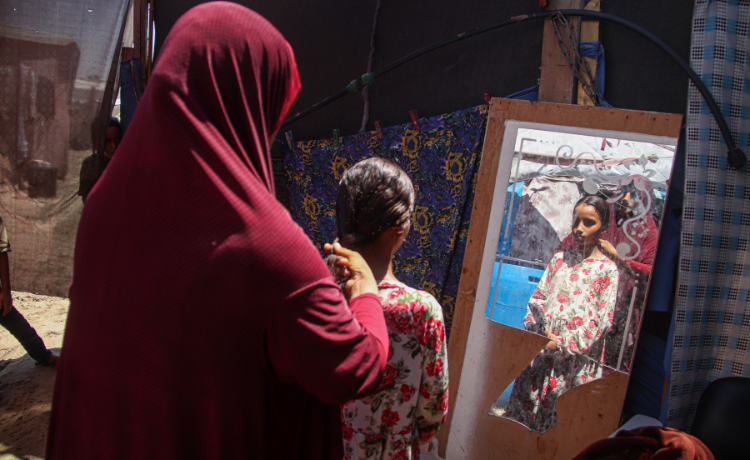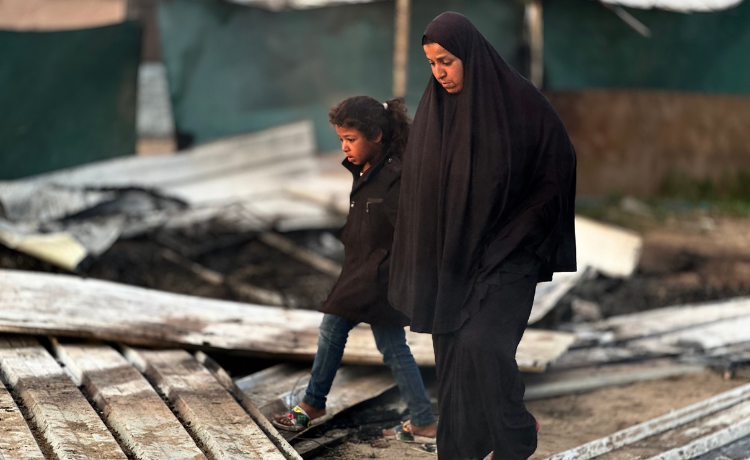News
From natural process to nightmare: How Gaza’s women and girls cope with their periods in a war zone
- 02 June 2025
News
GAZA STRIP, Occupied Palestinian Territory – “Sometimes I need pads and soap more than I need food,” said Aisha*, a young displaced girl in Gaza, revealing a serious burden too often overlooked in crisis settings – menstrual health.
Since 2 March 2025, Israel has imposed a total aid blockade on Gaza that has caused the complete depletion of hygiene supplies, including sanitary pads for menstrual health. Almost 90 per cent of water and sanitation infrastructure in Gaza has been either destroyed or partially damaged, and fuel for water pumping and distributions has now run out.
As nine in ten households face severe water shortages, women and girls are forced to manage their periods without clean water, soap, supplies or even privacy. Many now describe menstruation as a source of anxiety and isolation.
“My period started while I was in a crowded shelter. I only had one pad, so I wrapped it with toilet paper to make it last,” said a young girl from Gaza. “I couldn’t wash, and the pain was horrible. I sat in silence crying until the end of the day.”
There are around 700,000 women and girls of menstruating age in Gaza, including thousands experiencing their first period – under bombardment and in filthy, cramped displacement camps with no chance of changing in privacy.
No privacy, pads or protection

One doctor in Gaza told UNFPA, the United Nations sexual and reproductive health agency,
“Every day, I witness women battling menstruation, pregnancy and childbirth in degrading conditions. As a woman myself, I feel this deeply. These should be natural experiences, not sources of distress and pain.”
“I see strength in women’s eyes, but I also see deep pain and the stripping away of dignity,” continued the doctor, who wished to remain anonymous for safety reasons. “In emergencies, women and girls are among the most vulnerable. I know exactly what it means to get your period without access to sanitary pads.”
More than 10 million sanitary pads are needed each month in Gaza, yet less than a quarter of this number is available. Many women and girls are forced to use old clothes, torn fabric, or sponges, often reusing them without proper washing.
“I tore my only shirt into pieces so my daughters could use them instead of pads,” said a father of four daughters, displaced from Jabalia in northern Gaza.
These makeshift solutions are not only painful and undignified, they can cause reproductive, sexually transmitted and urinary tract infections that can lead to long-term gynaecological complications. Thousands of women in Gaza are expected to suffer from these conditions, many of them going untreated due to the collapse of the health system.
In overcrowded shelters, privacy is almost nonexistent. “There's no privacy. I wait my turn at the bathroom for hours just to change or bathe,” shared one girl. Another said simply, “I use pieces of my clothes instead of pads… and I got an infection.”
The psychological toll is just as severe. Women and girls speak of deep shame, fear of leaks, and constant anxiety. One adolescent girl expressed the deep frustration and helplessness so many feel: “Every time my period comes, I wish I weren’t a girl.”
Ensuring menstrual health

UNFPA has remained on the frontlines of the response in Gaza, and as co-lead on coordinating gender-based violence protection is working to ensure menstrual health is fully integrated across humanitarian assistance in Gaza.
Since October 2023, more than 300,000 women and girls received a two-month supply of disposable menstrual pads, and over 12,000 new mothers were provided with postpartum kits, supporting them through the most vulnerable period following childbirth.
UNFPA also distributed menstrual hygiene supplies, along with cash and voucher assistance, to help more than 150,000 women and girls meet their basic hygiene needs. Through this flexible support, displaced women were able to purchase what they needed most, from pads and soap to underwear and towels.
In addition, over 6,200 adolescent kits have been distributed across Gaza, providing hygiene items, educational materials, and items such as whistles and torches. UNFPA has supported 16 women and girls’ safe spaces, which have provided essential services to more than 175,000 people through gender-based violence prevention, psychosocial support, risk mitigation, and sexual reproductive health and rights awareness. Finally, six mobile maternity units have also been deployed to support health facilities with life-saving supplies, including treatments for urinary and reproductive tract infections.
“Food keeps us alive, but pads, soap and privacy let us live with dignity,” said Maysa*, a displaced woman in Khan Younis. “When we receive hygiene kits, it feels like someone finally sees us. They don’t just protect our health, they protect our dignity.”
*Names changed for privacy and protection